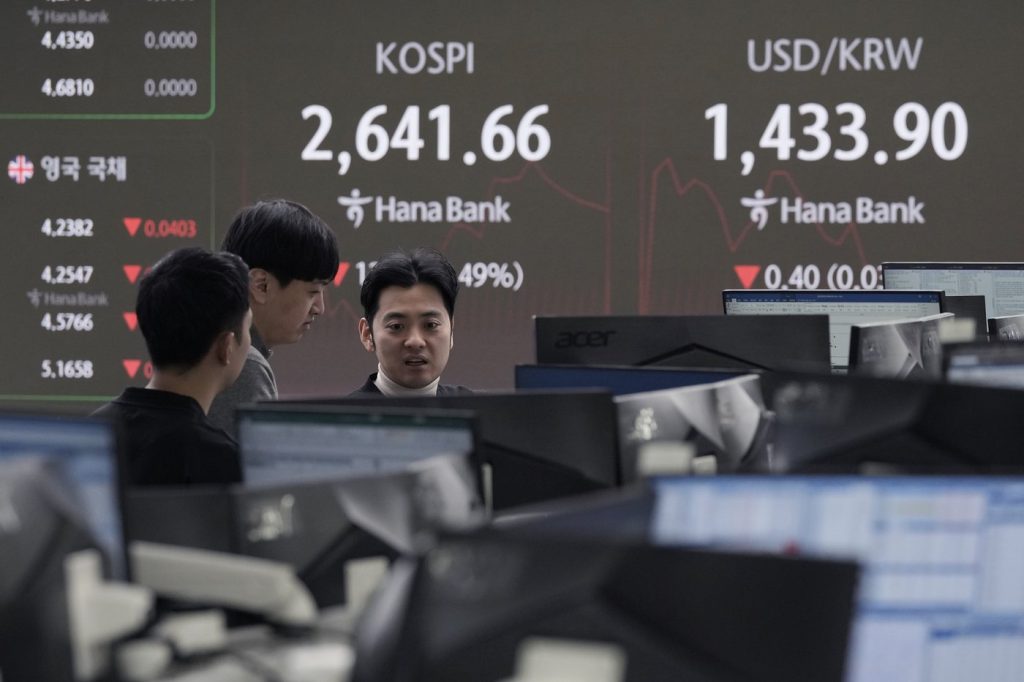BANGKOK (AP) - Asian shares presented a mixed performance on Monday following a sharp decline in U.S. stocks, which dropped significantly as economic reports indicated that consumers and businesses are increasingly concerned about President Donald Trump's policies. Japanese markets were closed for a holiday, limiting trading activity in Asia.
In Hong Kong, the Hang Seng index fell by 0.6%, settling at 23,348.82 points, while the Shanghai Composite index decreased by 0.1%, closing at 3,375.29. Conversely, the Australian S&P/ASX 200 saw a slight increase, rising less than 0.1% to 8,300.80. However, South Korea's Kospi index shrank by 0.7% to 2,636.55, and Taiwan's Taiex index fell by 0.6%. India's Sensex closed down by 0.9%.
On the previous Friday, the S&P 500 index experienced a notable decline of 1.7%, marking its worst day in two months and closing at 6,013.13. The Dow Jones Industrial Average also fell, losing 748 points, or 1.7%, to reach 43,428.02. Meanwhile, the Nasdaq composite dropped by 2.2% to 19,524.01.
A report from S&P Global indicated that U.S. business activity is nearing a standstill, with growth slowing to a 17-month low and an unexpected contraction in service sector activity. Many businesses expressed pessimism regarding their futures, influenced heavily by uncertainties stemming from federal policies, including spending cuts and tariffs. Chris Williamson, chief business economist at S&P Global Market Intelligence, noted the widespread concerns regarding how these policies could impact sales and increase supplier prices due to tariff-related hikes.
Ken Wattret, a global economist at S&P Global, emphasized that rising U.S. tariffs and associated countermeasures have been taken into account in forecasts since December 2024. He highlighted that trade weakness is the primary factor contributing to the anticipated slowdown in global real GDP growth rates this year, with weak investment posing a considerable downside risk.
Another report indicated that U.S. consumers are preparing for increased inflation, influenced by potential tariffs that could elevate prices across various imports. The University of Michigan's recent survey revealed that consumers are now broadly predicting an inflation rate of 4.3% over the next 12 months, a significant jump from the 3.3% inflation expectation reported the previous month.
A third report noted that sales of previously occupied homes fell short of economists' expectations last month. This decline is attributed primarily to relatively high mortgage rates and the elevated prices of homes, which have been dampening sales activity.
Small-cap stocks, typically more sensitive to the U.S. economic conditions than large multinational companies, experienced more severe losses than the broader market, as reflected by the Russell 2000 index leading the declines. Notably, Akamai Technologies saw the most significant drop within the S&P 500, despite reporting stronger-than-expected profits for the most recent quarter. The cybersecurity and cloud computing firm's stock plummeted by 21.7% as investors reacted negatively to its future revenue forecasts, which fell below analysts' expectations.
Before the sharp decline on Friday, the S&P 500 had been relatively stable, buoyed by a series of encouraging profit reports that alleviated concerns over persistently high inflation. This inflation may hinder the Federal Reserve's ability to ease economic and financial market pressures through lower interest rates. Currently, the Fed has kept its main interest rate steady after making significant cuts at the close of the previous year. During the last policy meeting in January, Fed officials indicated that they might maintain this course for the foreseeable future amid concerns that Trump's proposed tariffs and mass deportations could exacerbate inflation.
In the early trading session on Monday, U.S. benchmark crude oil saw a minor decline, shedding 21 cents to $70.19 per barrel during electronic trading, while Brent crude, the global standard, decreased by 17 cents to $73.88 per barrel. The U.S. dollar strengthened to 149.28 Japanese yen from 149.24 yen, and the euro appreciated to $1.0512 from $1.0462.










